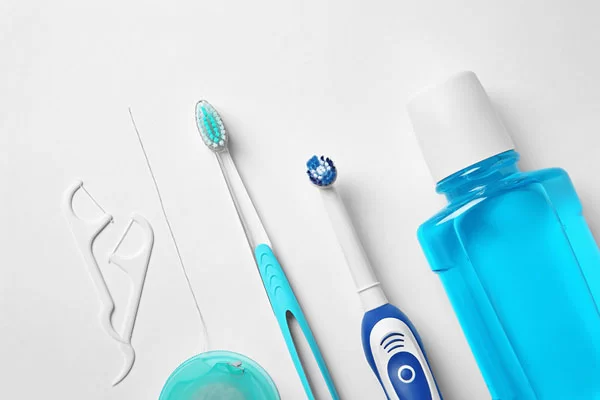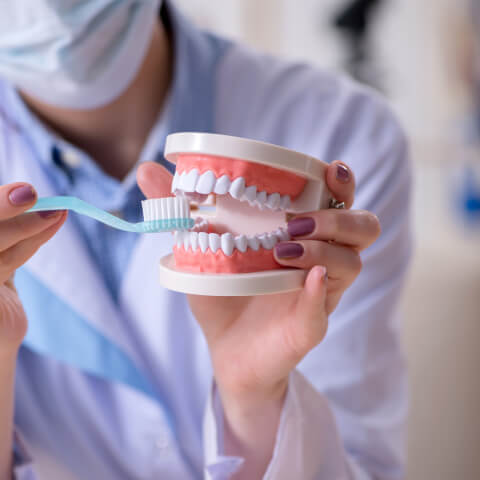Protect Your Smile, Your Health, and Your Implant Investment
Dental implantsare one of the most advanced solutions in modern dentistry for replacing missing teeth. Designed to function like natural tooth roots, dental implants restore strength, stability, and confidence to your smile. However, their longevity depends heavily on daily oral hygiene and the products you use at home.
Whether you’ve recently received dental implants or have had them for years, choosing implant-safe oral care products is essential for protecting your gums, surrounding bone, and the implant prosthesis itself.
If you’re looking for guidance from a trusted dentist in Issaquah, WA, or searching for a dental implant dentist near you, call Eastside Dental Implant Center at (425) 526-5424. We proudly serve patients in Issaquah, Bellevue, Kirkland, Sammamish, Newcastle, and surrounding Eastside communities.
Why Implant-Friendly Oral Care Products Matter
Unlike natural teeth, dental implants can’t develop tooth decay—but the gums and bone supporting them can become infected. Dental plaque, bacteria, and calculus buildup around implants can lead to peri-implant inflammation, gingivitis, and bone loss, which are among the leading causes of implant failure.
Using abrasive or inappropriate oral care products may:
- Scratch implant crowns or abutments
- Irritate gum tissue
- Increase bacterial buildup
- Shorten the lifespan of your dental implant
Choosing the right toothbrush, toothpaste, floss, and mouthwash helps preserve oral health, implant stability, and long-term success.
How to Choose the Best Oral Care Products for Dental Implants
Dr. Sidhu and the team at Eastside Dental Implant Center recommend the following implant-safe guidelines for patients in Issaquah and nearby areas.
1. Choose a Non-Abrasive Toothpaste
Abrasive toothpaste can wear down implant crowns, scratch tooth enamel on natural teeth, and irritate gum tissue.
What to look for:
- Low abrasivity (RDA under 100)
- Fluoride for enamel and bone support
- No harsh whitening agents
*RDA: Relative Dentin Abrasivity
Recommended implant-friendly toothpaste options:
Avoid most whitening toothpastes, as they’re often too abrasive for dental implants and crowns.
2. Use a Soft-Bristled or Electric Toothbrush
Hard bristles can damage gums and contribute to inflammation around implants. A soft-bristled manual toothbrushor a gentle electric toothbrushis ideal.
Best options include:
- Philips Sonicare(gentle or sensitive mode)
- Soft-bristled brushes from Oral-Bor Colgate
Electric toothbrushes—especially sonic technology like Sonicare—help reduce dental plaque more effectively while being gentle on implant-supported tissue.
Tip:Replace brush heads every three to four months or sooner if bristles fray.
3. Use Alcohol-Free, Antimicrobial Mouthwash
Alcohol-based mouthwash can dry out the mouth, increasing bacteria growth, bad breath, and gum disease risk.
Safe mouthwash options for implant patients:
Avoid mouthwashes containing hydrogen peroxide unless specifically prescribed, as they may damage implant surfaces over time.
4. Floss Daily with Implant-Safe Floss or Interdental Brushes
Flossing is critical for preventing inflammation and bacterial buildup around implants.
Recommended tools:
- Glide Pro-Health dental floss(waxed or unwaxed)
- GUM Soft-Picks
- TePe Interdental Brushes(soft bristles only)
Your Issaquah implant dentist may recommend specific sizes depending on your implant type, crown shape, or full-arch restoration.
5. Fluoride Use: Helpful When Used Correctly
Fluoride strengthens natural teeth and supports overall dental health. Most implant patients can safely use fluoride toothpaste and rinses designed for daily use.
However, fluoride exposure should be balanced—especially for patients using prescription-strength products. Always consult your Issaquah implant dentist before adding additional fluoride therapy.
Implant-Safe Oral Care Product List (Quick Reference)
Toothpaste:
- Sensodyne Pronamel
- Biotene Gentle and Soothing
Toothbrush:
- Soft-bristled manual brushes
- Philips Sonicare electric toothbrush
Mouthwash:
- Biotene
- ACT Restoring
Floss and Interdental Tools:
- Glide floss
- GUM Soft-Picks
- TePe interdental brushes
Not sure what’s right for your smile? Our dental office can personalize recommendations during your visit.
Daily Oral Hygiene Routine for Dental Implant Patients
To maintain excellent oral health and implant longevity:
- Brush gently twice daily for two minutes
- Clean carefully around the implant crown and gum line
- Floss once daily to remove plaque and bacteria
- Use an alcohol-free mouthwash daily
- Schedule regular dental checkups and professional teeth cleaning every six months
These habits protect not only your dental implants but also your overall oral and systemic health.
Lifestyle Habits That Support Long-Term Implant Success
- Avoid tobacco products, which significantly increase implant failure risk
- Maintain a balanced diet, low in sugar and acidic foods
- Drink plenty of water to prevent dry mouth and bacterial buildup
- Address grinding or jaw issues early to prevent stress on implant crowns
Frequently Asked Questions
Oral hygiene begins immediately after dental implant placement, following your dentist’s post-surgical instructions. Gentle brushing and flossing are essential during healing.
Yes. Electric toothbrushes with soft bristles are safe and often recommended. Avoid excessive pressure and let the brush do the work. You can use rotary heads around, but not directly on top of your implant crowns.
Redness, swelling, bleeding, pain, bad breath, or a persistent bad taste may indicate inflammation or infection. Contact your dentist near you promptly for a checkup and treatment options if necessary.
No, dental implants cannot be whitened. Whitening treatments affect natural teeth only. Cosmetic dentistry planning should be done before implant placement for optimal color matching.


